UAF BLaST celebrates scientists of the month for December 2023 to February 2024
By Amy Topkok
Since 2016, the Biomedical Learning and Student Training (BLaST) program at University of Alaska Fairbanks (UAF) has highlighted scientists from all biomedical fields through its Scientist of the Month articles. Maggie House, a second-year BLaST Scholar, was selected as the December 2023/January 2024 BLaST Scientist of the month and Michael Martins, a fourth-year BLaST Scholar, was selected for February 2024. Read more about BLaST's Scientist of the Month series on their website.
December 2023/January 2024 Scientist of the Month
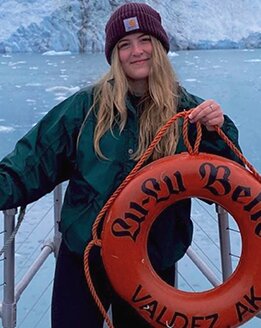
BLaST Scholar Maggie House as a deckhand in Valdez, AK. Photo credit: M. House, 2023
Maggie House, a second-year UAF BLaST Scholar and a senior, plans to graduate with a BS in natural resources and environment in May 2024. She grew up in a military family and has lived in many different US states and countries, but Tennessee has a special place in her heart.
She enjoys learning languages and about cultures and being outdoors. While serving as a deckhand on a glacier cruise boat in Valdez, AK, she became interested in climate change. She plans to apply to graduate school and become an environmental lawyer.
House’s current project, "Biomonitoring Cripple Creek’s Water Quality After a Reconstruction Through Macro-Invertebrate Diversity,” focuses on monitoring water quality at Cripple Creek in Fairbanks, AK, through the Alaska Rivers lab of the USGS Alaska Cooperative Fish and Wildlife Research Unit. House collected macroinvertebrate samples, which are a strong indicator of an ecosystem’s health. The Cripple Creek restoration project is an ongoing project overseen by local organizations.
House collected her macroinvertebrate samples this past summer after the historic channel regained flow for the first time in nearly a century. She also assisted with winter ice measurements of Cripple and Happy Creek where she discovered that water flow under the ice existed during the winter and contributed to the creek’s erosion. Her research was highlighted in the US Fish and Wildlife Service article, “Natural flows return to Cripple Creek,” by Christian Thorsberg.
“I have a firm belief that the health of our environment is intertwined with the health of humans. I am interested in making science-related issues more understandable, for everyone to be a part of their local community,” House said. “In my future, I see myself continuing to work towards strengthening the relationship between humans and nature and promoting the conservation of our dependence on one another.”
House is mentored by Christi Buffington, a Science Education Specialist at the International Arctic Research Center. House shared, “I have never met anyone who was genuinely so passionate about helping others learn and participate in science. I knew very little about conducting research, and with Buffington’s guidance, I am now continuing a second research project. I also would like to thank Dr. Jeffrey Muehlbauer who helped me learn more about macroinvertebrates and create my bio-monitoring methodology.”
"Maggie's curiosity is contagious; kids in a summer camp crowded around her to learn all about bugs, water quality and how they can be good stewards. She's a patient and engaging communicator. The kids want to be just like Maggie when they grow up!” Buffington said.
House published her data as part of the Global Learning and Observations to Benefit the Environment (GLOBE) program, an international organization highlighting citizen science. House honed her mentorship skills by mentoring and training younger students in STEM at the 2022 GLOBE Alaska Student Research Symposium for seventeen rural Alaska communities.
House also was a guest scientist at the Youth for Habitat program in June 2023 in the local Fairbanks Soil and Water Conservation District, where she and others helped provide shade for salmon habitat. In House’s BLaST career, she is mentored by Lori Gildehaus and Sarah Barcalow, BLaST Research, Advising and Mentoring Professionals.
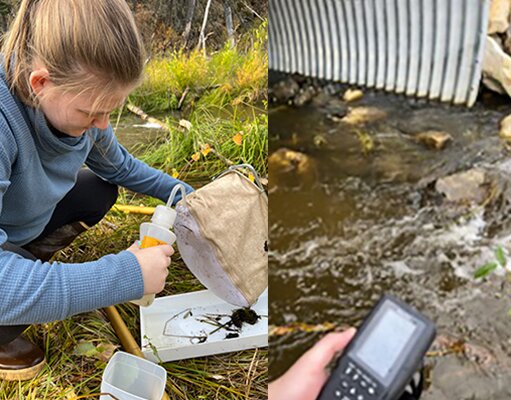
Maggie House collecting macroinvertebrate samples and monitoring water flow at Cripple Creek. Photo credit: C. Buffington, 2023
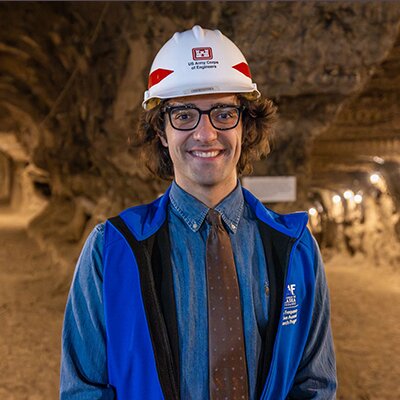
BLaST Scholar Michael Martins at the Permafrost Tunnels in Fairbanks, Alaska, May 2023. Photo credit: UAF/GI Daniel Walker.
February 2024 Scientist of the Month
Michael Martins, a Brazilian and American citizen, is a fourth-year BLaST Scholar and a senior at UAF. Martins will graduate in May 2024 with a BS in mathematics and a minor in Arctic skills. After graduation, he will join the Research Vessel (R/V) Thomas G. Thompson as part of the Arabian Sea Transition Layer (ASTRaL) Departmental Research Initiative in Goa, India.
He plans to pursue an Alaska-based fellowship and serve in the NOAA Corps, one of the nation’s eight uniformed services. Martins enjoys ski-mountaineering and playing chess in his free time.
Martins’ current research investigates a new method to derive wind and temperature readings within the ionosphere using artificial airglow, which can be created by ionospheric heaters at UAF’s High Frequency Active Auroral Research Program (HAARP).
“This place is the heart of my research, and they have the biggest ionosphere heater in the world,” he said. Martins plans to present his findings at the 2024 Coupling, Energetics and Dynamics of Atmospheric Regions (CEDAR) Workshop in June 2024, in San Diego, California.
Martins’ previous research started with the Nearshore Ecology Field Course (MSLF 421) where he developed a research question investigating the effect of cold water in scuba diving on cognitive performance while engaged in chess puzzle-solving. He tested his hypothesis during spring break of 2023 with the UAF College of Fisheries and Ocean Sciences’ American Academy of Underwater Sciences (AAUS) dive program at the Kasitsna Bay Laboratory, a NOAA field station located near Seldovia, AK. His findings were published in May 2023 by the Chessable Science team through a Chessable Research Award, a competitively selected chess research project from university-based researchers.
Martins also participated in May 2019 in the STEMSEAS program for undergraduates aboard UAF’s R/V Sikuliaq on a nine-day transit from San Diego, CA, to Seward, AK, where he helped conduct research ranging from Next-Generation Sequencing using the Oxford Nanopore MinION, examined lead contamination using a X-ray fluorescence for elemental analysis, and collected and analyzed data from conductivity, temperature and depth (CTD) casts. Martins received an American Geophysical Union (AGU) travel grant and presented about his experience at the 2019 AGU Annual Conference in San Francisco, CA.
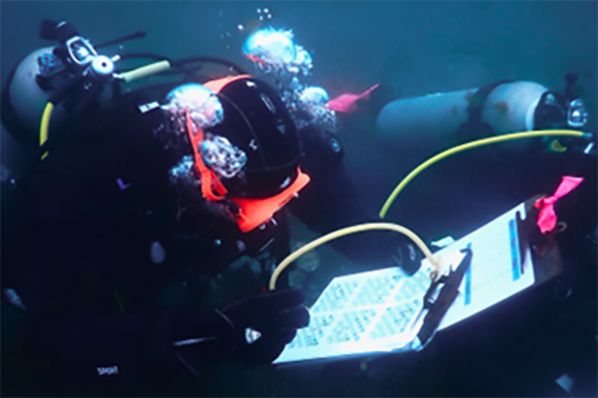
Martins took this photo underwater of classmates playing chess in cold water in the AAUS dive program at the NOAA Kasitsna Bay Laboratory, March 2023.
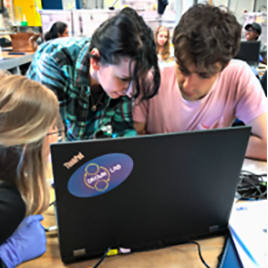
BLaST Scholar Michael Martins at the Permafrost Tunnels in Fairbanks, Alaska, May 2023. Photo credit: UAF/GI Daniel Walker.
Martins credits his success to his mentors who invest in him tirelessly. He feels fortunate to work on his dream research project under the mentorship of Mark Conde, PhD, who previously worked with Martins through the Undergraduate Research and Scholarly Activity (URSA) program at UAF.
Martins appreciates the advocacy of his many Research, Advising, and Mentoring Professionals (RAMPs), Nikola Nikolic, Emily Sousa, and especially Andrew Cyr, PhD.
Martins earned the 2023 Gold Congressional Award, a national award that recognizes young people for setting and meeting goals in volunteerism, personal development, fitness and expedition/exploration.
He thanks his mentors, JR Ancheta, Heidi Shepard, and Evita Maniatopoulou, for their help in gaining this achievement. Martins considers himself extremely privileged to also be mentored by Eduardo Jany, Benjamin Keisling, PhD, Brenda Konar, PhD, and peer-mentor, Torin Hooge.
For any questions about this or any BLaST Scientist of the Month article series, please contact Amy Topkok, BLaST Outreach Coordinator, at aktopkok@alaska.edu. More articles can be found on the BLaST Scientist of the Month website.
The Coordination and Evaluation Center at UCLA is supported under award number U54GM119024.

Grow Together.
